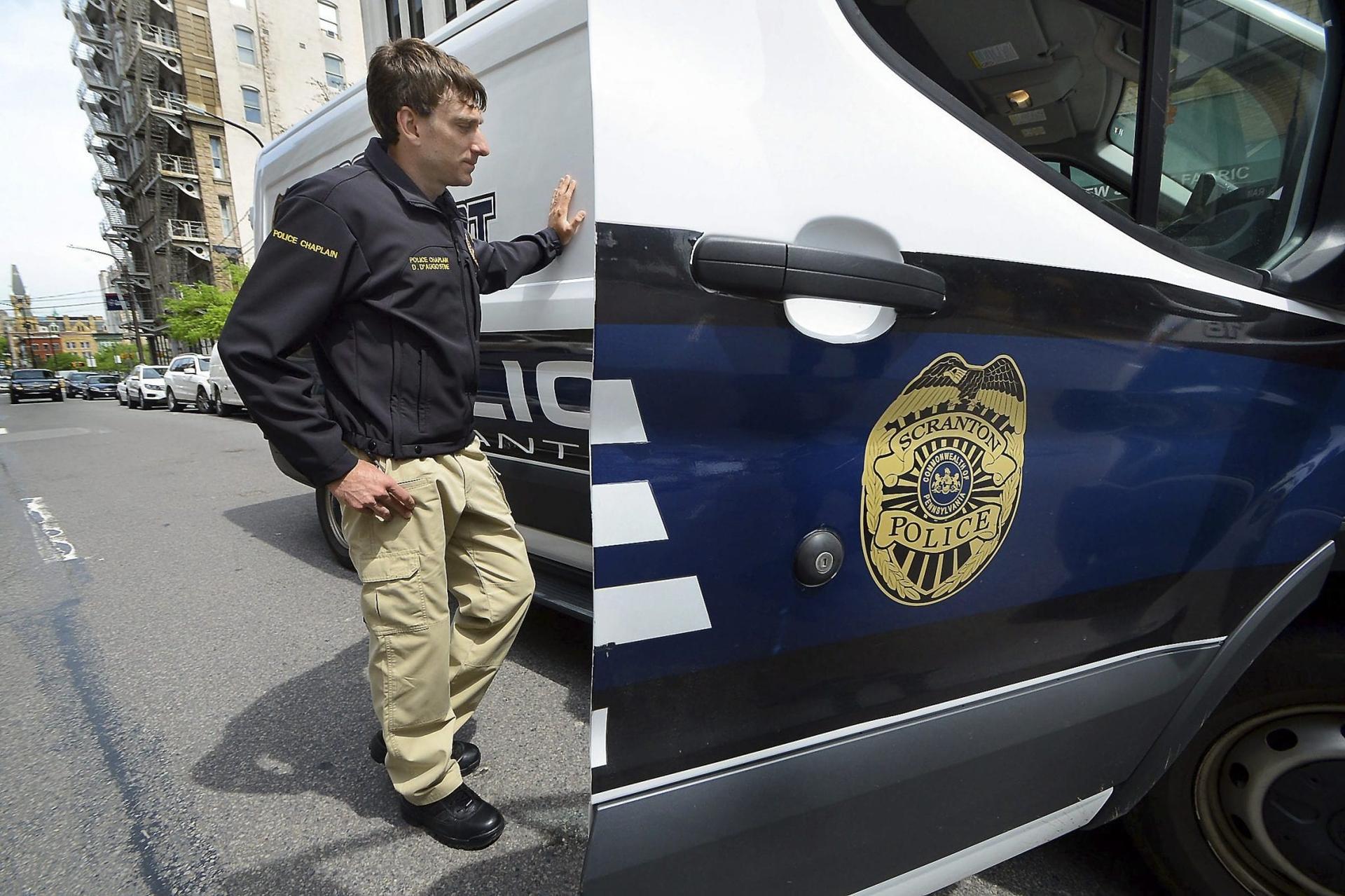SCRANTON, Pennsylvania — The man looked stunned after Patrolman Paul Tomczyk handed him a few pieces of paper.
The officer just finished explaining that his girlfriend, who is the mother of his children, had requested an emergency protection from abuse order against him when Capt. Dennis D’Augostine threw him another curveball.
He asked if he could pray for him.
D’Augostine, 37, is one of two front-line chaplains with the Scranton Police Department.
Formerly the lead pastor at Steamtown Church on Pittston Avenue, he stepped back to a support role there to focus on transforming what had been a ceremonial position — where the duties entailed little more than saying prayers at ceremonies — to one entwined with community policing, a brand of law enforcement in which officers forge strong personal ties with the neighborhoods they protect.
His church pays his salary, so his service comes at no expense to the city.
To go from soft-spoken, nondenominational pastor to police chaplain, he shaved his beard and cropped short his shaggy mop of hair. He wears a badge, a bulletproof vest and tactical boots. He has a radio, but carries no firearm or handcuffs. He has no authority to arrest anyone.
Jesse Miller, lead pastor at City Lights Church in Scranton, is the city’s other front-line chaplain. Officer Thomas Genovese is assigned to the chaplain program as an officer liaison, though his police duties come first. The department seeks a third volunteer chaplain.
D’Augostine’s post, the first of its kind in Lackawanna County, started about two years ago. It follows a national trend in which chaplains are taking a stronger role in community policing.
Departments across the country are under increased scrutiny and reeling with public image problems amid accusations of racial profiling and brutality.
Scranton Police Chief Carl Graziano said an active chaplain, who spends time on the beat with other officers, injects a gentler demeanor into the mix.
“When you see the worst that people can do, you become very guarded,” he said of police.
A chaplain at the scene of a domestic dispute could turn a potentially explosive incident into one that ends in peace.
Since taking the top spot at the Scranton Police Department, Graziano has made a number of progressive moves to improve relations between officers and the community, including bringing back neighborhood beat officers who patrol on foot and on bicycles.
D’Augostine graduated from what is now Clarks Summit University’s seminary. He lives in West Scranton with his wife, Kelly, and three sons.
He splits his working hours between his church and the department, often riding alongside another officer into the wee hours of the morning.
One of the most critical jobs D’Augostine and Miller perform is notifying family members when a loved one has died. Many officers say relief from that burden alone has made their jobs easier.
‘Helpful … in a spiritual way’
Officer Nancy Baumann, a tough veteran cop from Manhattan who never lost her New York accent, pulled her cruiser around onto Front Street in South Scranton. D’Augostine was riding shotgun.
Baumann saw something she didn’t like and honked the horn.
A man emerged from one home, and she quickly explained that his car, with its rear end up on blocks, violated a city ordinance. She wasn’t leaving until he took it down.
“Normal citizens don’t know what all of the laws are,” she said. “You have to teach them.”
The man explained that he couldn’t take it down without help.
“I’ll help you,” Baumann said blankly. She and D’Augostine exited the cruiser and helped guide the car onto the ground.
The man and Baumann had a history, she said. He had found his mother dead on the couch last fall, and Baumann was the officer dispatched to investigate. He was very distraught, she said, which is where a front-line chaplain might step in.
“I think Dennis would have been more helpful, maybe in a spiritual way,” she said. “I mean, I don’t know if the guy believes in God or anything, and I don’t think that that’s what Dennis is here for, to make everyone believe in God or whatever, but he could do more spiritual stuff that I can’t.”
‘Face of God’
A Supreme Court decision from the 1970s paves the way for religion and public agencies to lock arms while upholding the First Amendment’s establishment clause, which says the government cannot favor one religion over another.
In Lemon v. Kurtzman, the justices established the three-pronged “Lemon Test,” which, as it translates to D’Augostine’s position, says he must have a secular purpose, must not excessively entangle the government with religion, and neither proselytize nor inhibit religion.
That means he can ask someone if they would like to pray, but can’t preach while wearing the badge.
The Pennsylvania State Police has 71 chaplains scattered across the commonwealth. The FBI has its own chaplain program, and many large cities have chaplains — either trained officers, volunteers or both.
Chicago’s Police Department began its chaplain program in 1980. Director Rev. Dan Brandt said his chaplains, some of whom are duly sworn officers, support the department’s 11,500 officers and 5,000 civilian employees. They generally do not engage the community as in Scranton.
Brandt’s most important job, he said, is reminding officers of the value of their work.
“In some neighborhoods, throughout the course of the day, they are the only face of God or normalcy or order that some folks get the opportunity to see,” Brandt said. “That’s key — reminding them of the sacred nature of the work is something that’s very important.”
As they traverse the city streets of South Scranton together, Baumann and D’Augostine needle each other relentlessly.
D’Augostine grew up in a Catholic household in New Jersey. Unlike Baumann, there’s no trace of an accent when he speaks.
And he and Baumann have very different opinions about where to get the best local pizza.
“I’m from Ocean City, New Jersey, originally, so I know my pizza,” he said. “I’m going to say the best pizza is …”
“I didn’t know pastors lie,” Baumann said, cutting him off and shooting him a coy look. “You’re saying, ‘I’m from Ocean City, New Jersey, so I know my pizza.'”
“Where’s the lying at? I’m Italian from South Jersey,” he shot back.
“Doesn’t matter, they have (expletive) pizza in New Jersey compared to Manhattan,” she said.
The conversation disintegrated into further lighthearted jostling.
“I love Dennis and Jesse (Miller),” Baumann said. “I think they’re down to earth. … I just think it takes a lot of weight off the police officer when it comes to the really, really serious stuff.”
Expanding program
While D’Augostine can respond to calls from other departments if asked, he’s working to get training for other chaplains to serve on the front lines in their municipalities.
He’s undergoing an intense screening period to join the FBI’s chaplain program, and working with other departments in the county.
“I want to raise up chaplains for departments that want chaplains,” he said.
One Thursday afternoon, 11 men and women sat in the police headquarters roll call room for a training session.
They dissected trauma and its after-effects on the mind. They talked about how a chaplain, even without police powers, can be a critical ally.
“Most of the time, the cops want you because you’re their second set of eyes,” said Rev. Daniel Schafer, a pastor and chaplain from New Jersey who led the two-day training. “I can’t tell you how many times that a cop or a firefighter will say, ‘Hey, I turned around on that call and I saw that you were there and I was OK.'”
However, not all cops see the chaplain program’s purpose.
Graziano said even in his own ranks, some officers, who find comfort in routine and don’t like it disrupted, have yet to embrace it. Citing other departments, the chief said it typically takes about five years to get everyone to buy in.
Brandt said he has seen even atheists accept chaplain programs because the chaplains strengthen the whole department.
“They may not feel that they’re going to need the services, but they know that the guy next to them, whose life is in their hands, has that support system,” Brandt said. “Even if you don’t feel the need for it yourself, you’re safer for it.”
David Clark, of South Canaan Township, hung up his badge three years ago after his second DUI. He sat that day in the roll call room among other cops and pastors looking to become chaplains.
“When I got involved in law enforcement, I was working obnoxious amounts of hours,” he said, explaining that he soaked the stress from the job and all of his free time in booze. “As I got older, those behaviors became bad habits which ultimately became addictions.”
He longs to return to law enforcement, but said he doesn’t feel like he deserves it unless he can give something back. So he is taking classes at Clarks Summit University, and working to obtain his equine therapy license to help other cops.
In addition to serving his local police department as a front-line chaplain, Clark envisions a retreat at his farm for police who, like he did, need a chance to dry out.
“After several falls and hard lessons learned, I decided this is the way I’ve got to go,” he said.
‘Still a human’
It was almost 2 a.m. when Officer Tomczyk parked his cruiser on Thunderbird Drive.
With the emergency PFA order in hand, he and D’Augostine rapped on the apartment building’s aluminum storm door.
Bewildered, and slightly agitated, a couple in pajamas answered. It took a few moments to realize that they weren’t the ones the police sought that night.
After about five minutes, the man they were seeking appeared from behind the building, still wearing his work uniform. Tomczyk had spoken with him by phone earlier and he knew the cops would be coming soon.
His girlfriend had requested the PFA, alleging that he had pushed her out of his car, threatened to kill her father and drove off with their son.
She asked the court to bar him from contacting her and their two children, the 1-year-old boy and a daughter, born just 10 days earlier and in a neonatal intensive care unit out of town.
The 22-year-old man was visibly shaken. He told the officers he and the woman had a loving relationship and didn’t understand the PFA.
D’Augostine’s prayer was simple. He put his hand on his shoulder and asked God to protect his little girl and help her body to heal.
In those few moments, the man’s rigid exterior melted. He started sobbing gently.
After the prayer, he flicked on his cell phone and asked the officers if they wanted to see photos of his baby girl.
Back in the cruiser, Tomczyk debriefed the encounter.
“Whether he did what he did or not, he’s still a human being,” Tomczyk, the patrolman, said. “He saw care. … He’s going to be more receptive to the Scranton Police Department in the future whether he needs us or we need him.”
Information from: The Times-Tribune
















